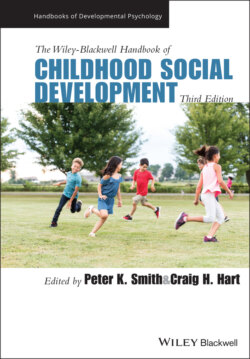Читать книгу The Wiley-Blackwell Handbook of Childhood Social Development - Группа авторов - Страница 15
Foundations of the Modern Era
ОглавлениеThe ideological underpinnings of the modern era can be traced to an intellectual awakening that originated during the 1800s and continued into the mid‐1900s (the emergent and middle periods; Collins, 2011). Interest in child socialization and development grew out of the enlightened humanitarian values and novel theoretical speculations that were expressed in the writings of philosophers, psychologists, educators, and physicians during the mid‐ to late 1800s. These innovative ideas challenged prevailing perspectives on a range of sociocultural and scientific issues including the origins of morality, the determinants of crime and juvenile delinquency, the causes of mental illness, and the value of education for children.
By the turn of 20th the century, these ideological forces inspired new ways of thinking about childrearing and development. Critical in this shift was the view that children’s development was driven not only by forces acting inside the child (e.g., the child’s nature), but also by forces outside the child, such as the socializing influences of families, peers, and cultures.
In the scientific community, the role of socialization and children’s social experience figured prominently in emerging theory and research on normal and abnormal development. Early examples include G. Stanley Hall’s (1844–1924) investigations of school children’s interests and experiences (White, 1994), John B. Watson’s (1878–1958) contention that learning drives development (Watson, 1913), and James Mark Baldwin’s (1861–1934) assertions that the child’s social environment, and the child’s reactions to this milieu, were essential and interrelated components of development (Cairns, 1994). During the early‐ to mid‐1900s, theorists such as Sigmund Freud, Erik Erikson, George Herbert Mead, Jean Piaget, and Lev Vygotsky contended that, among other influences, children’s development was affected by their experiences with adult caregivers and peers.
Freud (1856–1939) stressed the importance of early experience and theorized that conflicts between the child’s biological drives and rearing experiences (i.e., progressively across distinct psychosexual stages) shaped personality development. He also saw early parent–child play as a context that influenced children’s sense of self and shaped their emotional ties with caregivers (via brief separations and feelings of loss; Emde, 1994). In proposing the concept of the “looking glass self,” Mead (1863–1931) asserted that the individual’s self‐concept was based on the reactions they received from others (Mead, 1913). Erikson (1902–1994), a student of Freud’s, recognized the importance of parents and peers in children’s identity formation by arguing that relations with socializers could enhance or undermine a child’s sense of interpersonal trust, self‐worth, and social competence (Erikson, 1950).
Piaget (1896–1980) articulated a constructivist perspective in which organismic growth coupled with formative experiences – particularly conflicts with peers and other socializers – propelled not only children’s intellectual development but also their moral development (Beilin, 1994). The Russian psychologist Vygotsky (1896–1934), a contemporary of Piaget’s who died much younger than him, emphasized the social context of learning (Vygotsky, 1978). His concept of the zone of proximal development proved especially influential and was taken up later by Bruner in his concept of scaffolding. Many other scientists contributed to this paradigmatic shift and readers are encouraged to consult more detailed accounts of the intellectual currents and contributors that foreshadowed the modern era (e.g., Collins, 2011; Parke et al., 1994; Sears, 1975).
These early forerunners and their intellectual and empirical contributions created a foundation for social development as a discipline. Considered next are the theoretical and empirical elaborations and innovations that were erected upon this foundation during the following half‐century, or the modern era.
